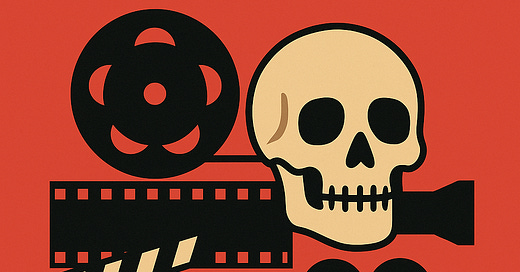Last week, a filmmaker friend asked me, “Do you think our industry is dying?” They didn’t mean a specific one — not Bollywood, not Hollywood, not Tamil or Telugu cinema, not even the indie scene. They meant the whole idea of a film industry: a space that sustains artists, creates work, and tells stories for the public.
And the uncomfortable answer is: maybe.
All around the world, signs are flashing red.
In Hollywood, major studios are slashing projects, laying off workers, and merging with each other in desperate attempts to survive. The aftermath of last year’s strikes left the writing and acting communities fractured, with little progress on the structural reforms they asked for — more transparency, more protection, and a fair share of the streaming profits.
In India, the numbers tell a strange story: box office revenue is rebounding, but few films actually succeed. A-list Bollywood films are flopping, regional industries are propping up the theatrical model, and yet the funding ecosystem remains brutally risk-averse. New voices are celebrated at festivals but rarely backed at scale.
In Nigeria, Nollywood is still prolific — but filmmakers face censorship, poor infrastructure, and platforms that take more than they give. In Iran, filmmakers are being jailed. In Myanmar, a regime blocks entire films from being seen. In Russia, exile is often the only route for dissident artists.
The point is: the problem isn’t one industry. It’s the systemic shrinking of space for bold, collective storytelling.
And yet… filmmakers are still making films.
People are crowdfunding shorts, setting up makeshift film labs in tiny towns, screening documentaries in school basements and union halls. Cameras are cheaper than ever, editing software is accessible, and communities — online or in person — are still rallying around story.
So maybe it’s not the film industry that’s dying.
Maybe it’s just the industrial part of it — the idea that films must be filtered through large companies, 3-act pitch decks, and multi-country distribution plans to matter. Maybe what we’re watching is the death of the factory, not the artform.
And if that’s true, then the future doesn’t belong to corporations.
It belongs to the people who know how to build outside the system — slowly, collaboratively, with care.
Are the film industries dying?
Maybe. But film isn’t.
Not if we keep making it.
📎 Further Reading
“All the Hollywood Action Is Happening Everywhere but Hollywood” – Wall Street Journal
Hollywood’s middle-class workforce is fleeing as production shifts to tax-friendly locales like Georgia and Canada.
👉 https://www.wsj.com/economy/all-the-hollywood-action-is-happening-everywhere-but-hollywood-d277c314?utm_source=chatgpt.com
“Is Pan‑India Appeal for South Indian Films Waning?” – Time
Explores shifting regional dynamics and the challenges of sustaining national momentum after blockbuster hits like RRR.
👉 https://time.com/6836455/india-subtitles-streaming-bollywood/?utm_source=chatgpt.com
“How OTT Platforms Are Reshaping Tamil Film Releases” – Times of India
Streaming giants are altering Kollywood’s release windows and marketing strategies—sometimes dictating the schedule.
👉 https://timesofindia.indiatimes.com/entertainment/tamil/movies/news/how-ott-platforms-are-reshaping-the-film-releases-for-tamil-films/articleshow/121815724.cms?utm_source=chatgpt.com
“Hollywood Is Losing Its Luster” – The Week
Highlights the 30% drop in production in California over five years and the potentially "Detroit‑style" decline awaiting L.A.
👉 https://theweek.com/culture-life/film/hollywood-losing-luster-production?utm_source=chatgpt.com
“’Film Bros’ Ruining Indie Movies or Saving Them?” – GQ
A smart look at how fan culture and indie fandom are reshaping distribution and audience engagement for indie films.
👉 https://www.gq.com/story/are-film-bros-ruining-indie-movies-or-saving-them?utm_source=chatgpt.com





It’s an interesting read—you’ve beautifully connected world cinema and how it’s evolving. The industry might be different, but the reason behind its challenges seems universal.
As you mentioned, cinema is an art form—and it's still thriving.
The way I see it, India underwent economic liberalisation in 1991, and now, cinema is going through its own phase of liberation.
Anyone with a phone today is a potential filmmaker, and any streaming platform is a potential channel to share that creation with the world.
I truly believe these are the best times. The best stories and films are yet to come—new eyes, fresh perspectives, and innovative formats will emerge.
And there will always be someone ready to watch. Some will enjoy, a few will be inspired, and others might evolve into something even more beautiful.
Kudos, Prachi!
Maybe what we’re watching is the death of the factory, not the artform.
This statement is so comforting. Isn’t it)
Nice 👌🏼